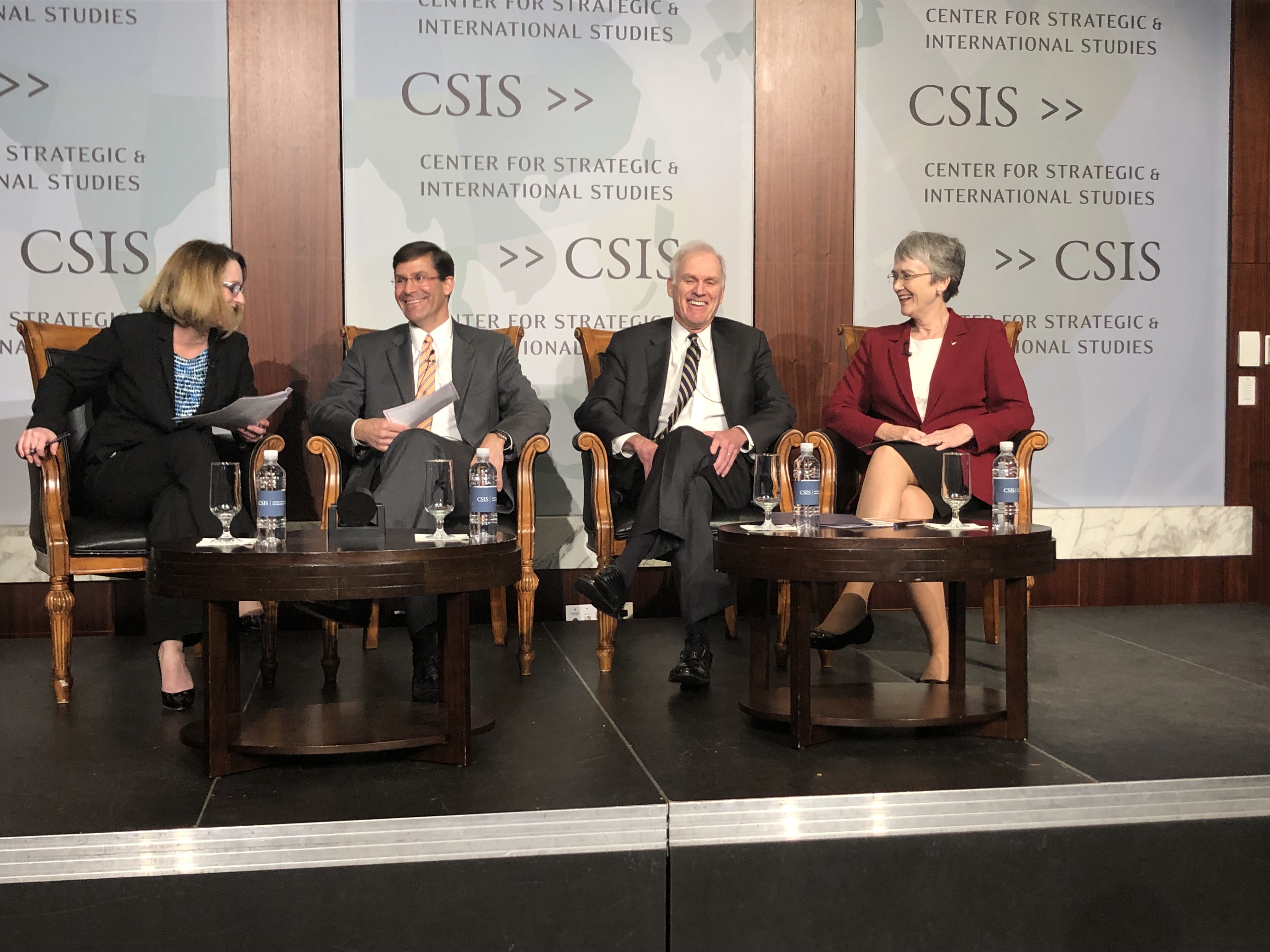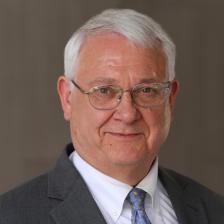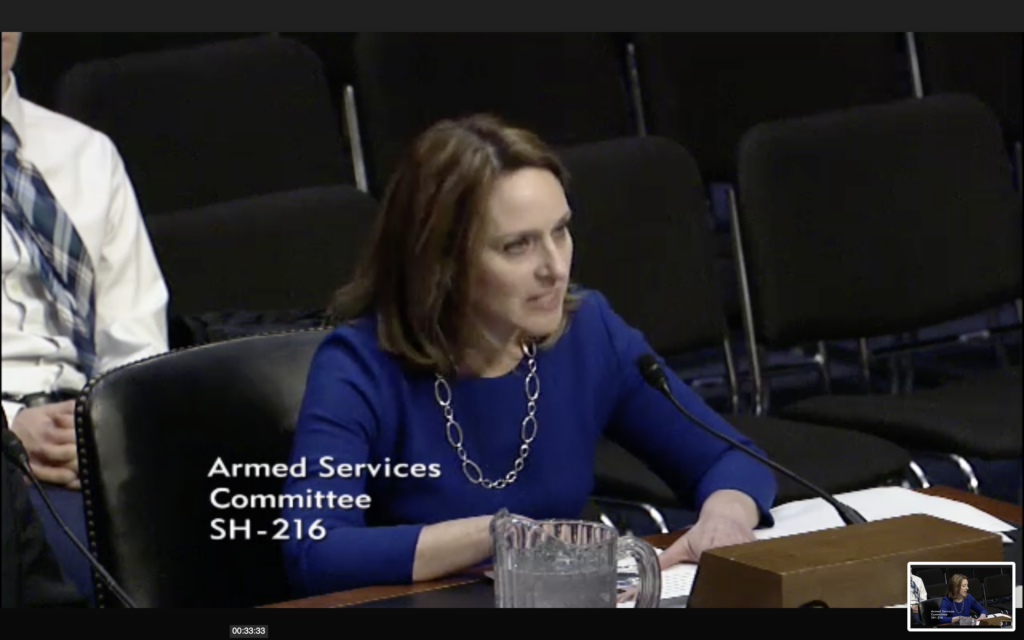
Left to right: CSIS moderator Kathleen Hicks, then-Army Secretary Mark Esper, then-Navy Secretary Richard Esper (who also oversees the Marines), then-Air Force Secretary Heather Wilson.
UPDATED with Hamre rebuttal WASHINGTON: One of the stars at John Hamre’s Center for Strategic and International Studies looks likely to follow in his footsteps as Deputy Defense Secretary: former Obama Pentagon policy official Kathleen Hicks.

Kathleen Hicks
A veteran of more than two decades in the Pentagon under Clinton, Bush, and Obama — rising from presidential management intern to Senior Executive Service to political appointee — Hicks brings the civilian bureaucratic experience that Biden’s pick for Defense Secretary, retired Gen. Lloyd Austin, sorely lacks. But neither has the political clout of a Jim Mattis or a Bob Gates to shake up the Pentagon internally or fight for defense priorities with the White House.
BEGIN UPDATE Now, CSIS CEO Hamre vigorously disagrees with that assessment. Minutes after we published the original version of this story, Hamre emailed us to object.
“Unfortunately you are reporting the superficial trajectories of modern American journalism,” Hamre told us. “I don’t know Lloyd Austin, so I can’t comment on that, [but] I do know Dr. Kathleen Hicks…. She is a superb intellect. She knows defense issues and has an open personality to deal with the changing dynamics of defense. She is both an intellectual and a practitioner. She knows how to evaluate complex defense issues, but is not lost in the arcana of thinktank-speak.
“Dr Hicks can accurately assess the substance of the issue but also understand the complex cross currents of political interests affecting it,” Hamre told us. “You will be greatly impressed.” UPDATE ENDS

John Hamre
To some of us who have covered the Pentagon for some time, Hamre is the gold standard for Pentagon deputies. He did an excellent job of looking ahead, identifying cyber and related IT vulnerabilities as a serious threat very early on, pressing hard to sculpt a fundamentally new defense trade relationship with America’s allies and managing the budget during one of the toughest times in modern American history. So Hicks has big shoes to fill.
Hamre offered Hicks a strong endorsement in a formal statement earlier today:
“I held that job and know what it takes to succeed. Dr. Hicks is a superb choice for this important job. She has the discipline, intellect, and organizational skill to make the Department work effectively for the Secretary. I have worked with Dr. Hicks now for seven years directly, and for an additional seven years indirectly. She has a strong moral compass and a keen commitment to the success of the Department and the well-being of its military and civilian personnel.” Remember that Hamre attended Harvard Divinity School, so he knows moral compasses.
Hicks is one of America’s most respected national security women, having served as one of the top people at CSIS (overseeing more than 50 staff), while also serving on the board of trustees of the Aerospace Corp. and the board of directors for the U.S. Naval Institute. Her nomination as DepSecDef will answer some of those who pushed hard for Biden to nominate a female Defense Secretary, which he did not do.
Austin is also notoriously uncomfortable with Congress, where he was once publicly savaged by the late Sen. John McCain, while Hicks has not only survived confirmation hearings but also testified as an expert — including, ironically, on the need for civilian leadership in the Defense Department.

Kathleen Hicks testifies before the Senate in 2017.
Under Obama, Hicks was a leading architect of major policy documents like the 2010 Quadrennial Defense Review and the 2012 Defense Strategic Guidance. She was also immersed in the interagency coordination process with the White House. All that gives her valuable experience of herding huge numbers of bureaucratic cats — a very different management challenge than the top-down command-and-control structures that her apparent boss-to-be, Gen. Austin, spent his career in. She’s also served on high-profile congressionally chartered commissions. And she’s even written for Breaking Defense.
What is she likely to do in her new role, assuming the Senate approves her? Hicks is generally cautious in her public comments, and most of her events at CSIS featured her as a moderator and interlocutor of distinguished guests, rather than a pundit expounding her own opinions. But there is still a track record to study.
“Hicks has a fairly extensive public record beyond what has been written at CSIS,” noted analyst Byron Callan in an email to his subscribers today. “We expect she will bring a sharp focus to 1) alignment between budgets and military concepts of operations v. China and Russia as well as a closer examination of those concepts and theories of victory. 2) a bigger push on DoD innovation and experimentation, and 3) work within DoD budget resources and not simply ask for more that’s unlikely to be realized. Hicks will also support closer relationships with allies to leverage U.S. advantage and policy won’t coddle authoritarian regimes.”
While Austin has plenty of experiences working with allies as head of Central Command, Hicks’ expertise on great powers and Pentagon reform can help cover what could be her boss’s blind spots.

Stanford professor Colin Kahl, a Middle East expert who served as national security advisor to then Vice President Biden, will occupy what is traditionally regarded as the Nr. 3 position in the Pentagon, undersecretary of policy, if the Senate approves him.

“Dr. Kath Hicks and Dr. Colin Kahl have the broad experience and crisis-tested judgment necessary to help tackle the litany of challenges we face today, and all those we may confront tomorrow. They will be trusted partners to me, the vice president-elect, and Secretary-designate Austin — as well as our dedicated civilian and military team — as we work to restore responsible American leadership on the world stage,” President-elect Biden said in a statement.
Finally, it’s been reported that Kelly Magsamen, former principal deputy assistant secretary of defense for Asian and Pacific Security Affairs now at the Center for American Progress, will be Pentagon chief of staff. Magsamen offers an impressive national security bio, having served on the National Security Council (NSC) staff for two presidents. She was special assistant to the president and senior director for strategic planning from 2012 to 2014, where she helped craft the 2015 U.S. National Security Strategy. Before that, she was served two years as senior adviser for Middle East reform during the height of the Arab Spring. Before dealing with that challenge, she was NSC director for Iran from 2008 to 2011.
We wish them all a very Happy New Year and the best of luck.
Army leader dismisses House proposal for drone branch creation
“Operating and defending against the drone threat is something that will be experienced by, you know, all formations at multiple echelons,” said Army Undersecretary Gabe Camarillo.


























